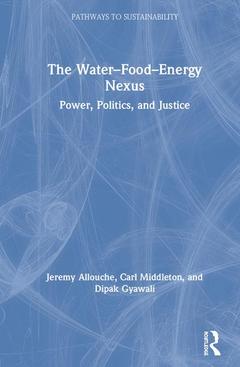The Water–Food–Energy Nexus Power, Politics, and Justice Pathways to Sustainability Series
Auteurs : Allouche Jeremy, Middleton Carl, Gyawali Dipak

The world of development thinkers and practitioners is abuzz with a new lexicon: the idea of "the nexus" between water, food, and energy which is intuitively compelling. It promises better integration of multiple sectoral elements, a better transition to greener economies, and sustainable development. However, there appears to be little agreement on its precise meaning, whether it only complements existing environmental governance approaches or how it can be enhanced in national contexts. One current approach to the nexus treats it as a risk and security matter while another treats it within economic rationality addressing externalities across sector. A third perspective acknowledges it as a fundamentally political process requiring negotiation amongst different actors with distinct perceptions, interests, and practices. This perspective highlights the fact that technical solutions for improving coherence within the nexus may have unintended and negative impacts in other policy areas, such as poverty alleviation and education.
The Water?Food?Energy Nexus: Power, Politics and Justice lays out the managerial-technical definitions of the nexus and challenges these conceptions by bringing to the forefront the politics of the nexus, around two key dimensions ? a dynamic understanding of water?food?energy systems, and a normative positioning around nexus debates, in particular around social justice. The authors argue that a shift in nexus governance is required towards approaches where limits to control are acknowledged, and more reflexive/plural strategies adopted.
This book will be of interest to academic researchers, policy makers, and practitioners in the fields of international development studies, environmental politics, and science and technology studies, as well as international relations.
1. Introduction: Nexus and nexuses
2. A critique of the global hegemonic nexus narratives
3. Integration for whom? Learning from the past
4. The knowledge nexus and transdisciplinarity
5. Hybrid governance and grounding the nexus
6. Nexus rights and justice
7. Ethics and the nexus
8. Conclusion: ‘Democratising’ the nexus
Jeremy Allouche is a Research Fellow at the Institute of Development Studies at the University of Sussex, UK, and a member of the ESRC-funded STEPS Centre.
Carl Middleton is Director of the Center of Excellence in Resource Politics for Social Development in the Center for Social Development Studies (CSDS) at the Faculty of Political Science, Chulalongkorn University, Thailand.
Dipak Gyawali is Pragya (Academician) of the Nepal Academy of Science and Technology and was Nepal’s Minister of Water Resources in 2002/2003. He conducts interdisciplinary research at the interface of technology and society, mostly from the perspectives of Cultural Theory.
Date de parution : 04-2019
15.6x23.4 cm
Date de parution : 04-2019
15.6x23.4 cm
Thèmes de The Water–Food–Energy Nexus :
Mots-clés :
Water Food Energy Nexus; Nexus Approach; Energy security; Nexus Thinking; Sustainability; IWRM; Environmental studies; UN; Food security; Energy Systems; Climate change; Nexus Concept; water-food-energy nexus; WEF 2009a; Political ecology; Civil Society; Dynamic sustainability; Water Governance; Nepal; Nexus Discourses; India; IWRM Paradigm; Thailand; Nexus Debate; Laos; Energy Policy; IWRM Principle; EJ Literature; Energy Resource; Resource Nexus; Recognitional Justice; Water Energy Nexus; Bagmati River; Nexus Literature; Water Food Energy Climate Nexus; Water Ethics; Energy Ethics



